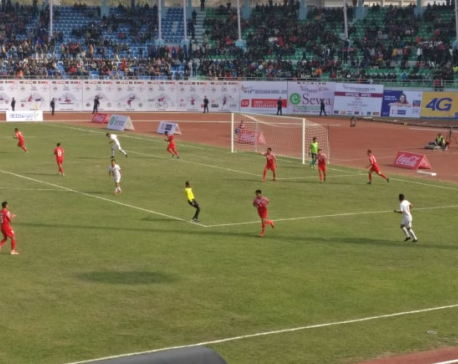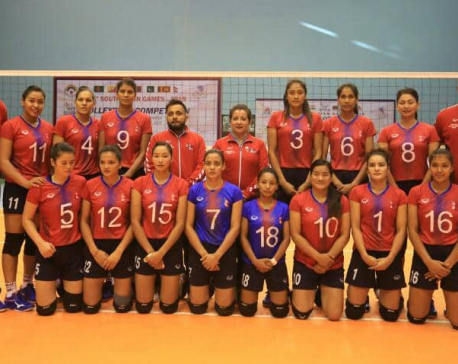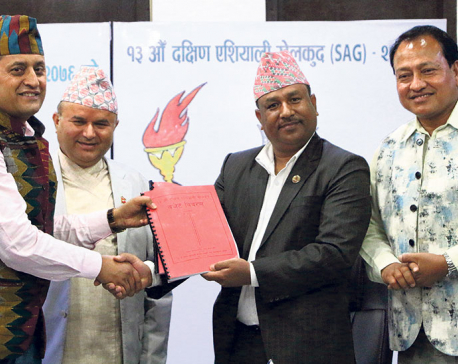
OR
He may have been contemplating the step since the 16-Point Conspiracy (SPC) that was hatched in-between Gorkha Earthquake aftershocks in June, 2015, but the abruptness with which revisionist turncoat Pushpa Kamal Dahal surrendered to the rank reactionaries of Khadga Prasad Sharma Oli took most observers of Nepali politics by surprise. Merger of renegade Maoists Baburam Bhattarai’s political platform into the proposed neocon outfit of lapsed leftists was less of a shocker.
Having reached the apogee of their respective political careers, the main concern of Bhattarai-Dahal duo now is to ensure that perks and privileges of having been former prime ministers aren’t put at risk for whatever reason. At this stage of life, securing the future of kith and kin has to be the main concern. ‘Family first’ is the fundamental faith in all conservative societies. An equally important priority has to be to accommodate longtime loyalists in lucrative positions of economy, polity and society to make sure that their own safety and security are free of all possible physical, financial or emotional threats. Only a party of the PEON can assure such an umbrella of all-round protection.
Despite the apparent suddenness of submission, the Six-Point Instrument of Surrender—to give the so-called agreement about electoral accommodation its proper name—is the logical extension of SPC agenda of institutionalizing the status quo in a constitutional manner. Failure of Nepali Congress in anticipating natural consequences of its capitulation to SPC was glaring, but the elephantine party probably has enough resilience to wait for the reactionary plot to play out and fade away. After all, they lingered around for three decades for the Panchayat polity to fail and fall.
Even though humdrum—there is hardly anything new in some sexagenarian Bahuns reaffirming their fraternity to promote a common faith—surrender of Bhattarai-Dahal duo stole the thunder from the portentous act of Messrs Brijesh Kumar Gupta and Hridayesh Tripathi throwing down their gauntlets into Tinau River and accepting complete defeat. Gupta was a latecomer to the cause, but desertion of Tripathi is sure to keep rankling Madhesbadi activists for quite a while.
Even though belonging to the Lost Generation—middleclass Nepali men born between 1950 and 1960 that grew up during the high noon of Shah Regime and felt the chill of Cold War in their formative years to remain morally unclear forever—Tripathi had discovered his calling a little early. He was one of the first post-Panchayat politicos to champion the Madhes issue when most of his contemporaries were quite happy in seeking careers in the-then ascendant parties such as the NC and the CPN-UML. With one of the pathfinders deserting the caravan mid-journey, it’s perhaps natural to get worried about the destination of ongoing Madhes struggle.
In his powerful poem Harlem, asks Langston Hughes: ‘What happens to a dream deferred?’ The literary master then speculates. ‘Does it rise like a raisin, fester like a sore and run, stink like rotten meat, crust into sugary cover or just sag?’ Hughes then ends the short poem with a cautionary question: ‘Or does it explode?’
Docile dissenters
Until lapsed-Maoist Jay Krishna Goit came up on the scene in 2004 with his militant Janatantrik Terai Mukti Morcha outfit, the struggle for the identity, dignity and autonomy of Madhes had largely been peaceful. Despite degeneration of yet another ex-Maoist Upendra Yadav’s Madhesi Janadhikar Forum into violent resistance once or twice—the gore in Gaur in March 2007 being a glaring example—mainstream political agitations seldom crossed limits of civilized protests.
Fringe armed groups running extortion rackets probably fleeced more hapless Madhesis than Pahadis who at least had the state to protect them and a place to find shelter along East-West Highway. Occasional aberrations apart, most Madhesi protests were mild in comparison to their ruthless and violent suppression by the state. The reason Madhes didn’t erupt into an orgy of vicious violence had as much to do with the overwhelming presence of an entirely non-Madhesi security apparatus of the government on the ground as the meekness of Madhesi leadership. Almost the entire line up of Madhesi activists even today consists of thoroughly domesticated middleclass males who want accommodation with the establishment under Khas-Arya domination rather than complete independence.
Illustrious examples
A cursory look into the background of Tripathi can be illustrative. Born into a well-off family of Madhesi Brahmans, his father packed him off to a school in mid-hill town of Palpa to save him from the demeaning environs of a backward village close to Susta along the Indo-Nepal border. Tripathi excelled in his studies, pursued the path of engineering education for a while and then deserted the discipline to study politics in the-then Soviet Union. Despite its apparent absurdity, such things happen. Just as hundreds of Nepali journalists travel every year to the People’s Republic of China to learn about freedom of the press, there was a time when Soviets actually taught politics, law and human rights to students from Third World countries.
Upon his return, Tripathi found his natural niche among the ranks of royal communists. Only after coming in contact with Gajendra Narayan Singh did he realize that a high-caste birth, childhood spent in the company of Pahadi schoolmates, a higher education abroad, and even marital ties with a Khas-Arya family were meaningless so long as the fundamental dignity of the entire Madhesi community was not established. That’s how he ended up in the Sadbhavana Party, travelled through the Tarai-Madhes Loktantrik Party, the Rashtriya Janata Party Nepal before homing back into a different nest of some other former royal communists.
No matter how fiery their speech, people like Tripathi have been schooled in the tradition of accommodation. When it appeared that his main competitor in the electoral fray of parliamentary constituency was going to be the NC, he had no hesitation in politically prostrating before his earlier bugbear—the UML and its strongman Oli—for forgiveness of past conduct and with inducement for future loyalty.
Antecedents of Brijesh Kumar Gupta are no less illustrious. Born into the prosperous Sahu family of Kapilvastu, it’s said that at one time his folks owned almost all prime land in Taulihawa. There might be a slight exaggeration in that landholding lore, but it’s true that Gupta’s father Bhagwan Das remained close to the royal family during Panchayat regime more on the strength of his wealth than political support.
Travelling through NC, TMDP and RJPN, Gupta has maintained the family tradition of marrying financial acumen with political ambition to retain the social status of a Vaishya family in a region dominated by higher castes of Hindu hierarchy such as Tripathis, Shuklas, Mishras, Pathaks and Shahs. His constituency now is such that he can’t hope to win without nurturing the ethnocentric support base of UML. He has taken a most natural decision. Unintended consequences of desertion of Tripathi and Gupta, however, may push Madhesi politics towards further radicalization.
The Tripathi-Gupta duo or their contemporaries haven’t been too well known for championing the cause of Madhesi Dalits, Muslims or Tharus. Most Mushars of Tripathi’s village don’t yet have citizenship certificates. Like Tripathi, Gupta makes no attempt to hide his Hindutva proclivities and they are extremely unlikely to come to the defence of Muslims on the Nepali side of Awadh for the fear of inviting the ire of Yogi Adityanath. What they did instead was keep the channels of communication between Khas-Arya regime and discontented Madhesis open. Their absorption into the dominant mainstream machinery may kill hopes and lead to intensification of Madhesi frustration.
Grovelling group
It’s possible to argue that Madhesi politicos can pursue the agenda of political dignity even by being in Khas-Arya parties. Experience shows that such an assumption doesn’t work. Fattened like lambs prior to elections, Madhesi lawmakers are then sheared like sheep in the legislature before being sacrificed at the altar of PEON in public. With the honourable exception of Pradip Giri, not one NC parliamentarian stood in favour of Madhesi rights during the promulgation of the fast-tracked constitution. The duty of Madhesi heavyweights in UML is to obediently speak, behave and act in the prescribed manner.
When intense socio-cultural and geopolitical heat make dreams of autonomy and dignity sag, it makes sense to wait and shuffle with what Gramsci calls pessimism of the intellect and optimism of the will till the springtime of people come. Hughes sings even more forcefully: Hold fast to dreams / For if dreams die / Life is a broken-winged bird / That cannot fly.
You May Like This

Nepal takes early lead against Bhutan
KATHMANDU, Dec 3: Early goal by Sujal Shrestha has given Nepal a lead of 1-0 against Bhutan in Men's Football... Read More...

Nepali women begins SAG volleyball with dominating win, men lose
KATHMANDU, Nov 28: Nepal women’s volleyball team overcame Bangladesh in straight sets on Wednesday to begin its South Asian Games on... Read More...

Taskforce demands more than Rs 5 billion budget for SAG
KATHMANDU, June 17: Budget formulation taskforce has demanded an ambitious budget to organize the 13th South Asian Games (SAG), which... Read More...

Just In
- World Malaria Day: Foreign returnees more susceptible to the vector-borne disease
- MoEST seeks EC’s help in identifying teachers linked to political parties
- 70 community and national forests affected by fire in Parbat till Wednesday
- NEPSE loses 3.24 points, while daily turnover inclines to Rs 2.36 billion
- Pak Embassy awards scholarships to 180 Nepali students
- President Paudel approves mobilization of army personnel for by-elections security
- Bhajang and Ilam by-elections: 69 polling stations classified as ‘highly sensitive’
- Karnali CM Kandel secures vote of confidence



















Leave A Comment